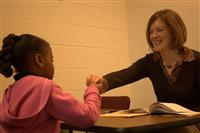By Jennifer Long, M.S., S.S.P. with Angela Smith, M.A., C.A.S
I promise no one grows up dreaming of being a school psychologist. Well, maybe the children of school psychologists do, but I doubt it. I know I certainly didn’t. Something about a car so full of test kits that you can’t fit your groceries in it doesn’t scream “dream job,” but somehow it is. Last week we celebrated School Psychology Awareness Week and it seems like a fitting time to reflect on the unique skills and aspects of this job.
So what is school psychology? I would describe school psychology as the perfect marriage between psychology and education. School psychologists are trained in mental health, child development, learning styles, behavior, and intervention planning. Sure, we do a lot of assessment, report writing, and paperwork but, believe it or not, all of those things can be fun. Assessing a child is like putting together a puzzle of how a kid learns best, helping them see their strengths, and identifying where they struggle. With that in mind, school psychologists assess for a number of academic and behavioral difficulties including learning disabilities, emotional problems, autism, and mental handicaps.
While assessment is certainly a large component of the job, school psychologists are trained in skills beyond assessment. School psychologists are key players in intervention planning. This allows us to provide quick, early help to children who are struggling. School psychologists can help identify a child’s specific skill deficits in the classroom and consult with school staff and parents about appropriate interventions to be used within the regular education setting. We assist teachers in implementing these interventions, monitoring the child’s response to intervention, and adjusting the educational goals accordingly.
In addition to academic concerns, school psychologists also address mental health issues. School psychologists, like school social workers and school counselors, help link student needs and school services with community services to provide a continuum of mental health care. Not only do we collaborate with community service providers and families but, at times, school psychologists provide counseling services related to interpersonal and family issues that interfere with school performance. Another growing role and function of the school psychologist, unfortunately, is crisis management and prevention. School psychologists are integral players in the development of a crisis response plan and assessing levels of risk given a particular situation.
We always say that parents are the best informants about their children. If you have concerns about your child’s performance in school there are a few simple steps to follow. First, maintain open communication with your child’s teacher. It is important to remember that there is a wide range of learning styles and rate of development among children. By working closely with your child’s teacher, you are able to stay on top any potential concerns that may arise and need to be explored. Secondly, you can ask your child’s teacher how school psychologists function in your school district. Often a school psychologist will be available at your child’s school one or more days of the week.
The National Association of School Psychology celebrated 2011 with the theme, “Every link matters. Make a connection.” With our various roles in the schools, we believe we can help our students and schools focus on creating positive connections within the school community. We work directly with students providing educational assessments, leading individual and group counseling sessions, guiding problem solving skills, and helping students develop positive self concepts by linking efforts to achievements. The importance of connections is not limited to students. We make connections within our schools by consulting and collaborating with teachers, staff, and parents about the needs of children. Helping our children and schools focus on positive school connections is at the heart of being a school psychologist. This is not only an important message directed towards students, but a valuable one for adults as well.














